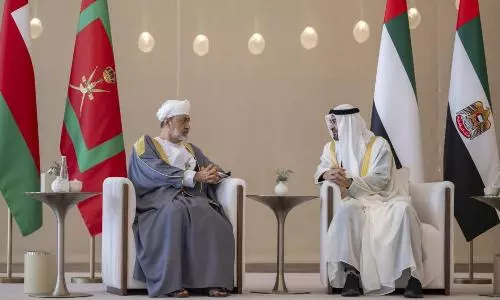
Israel swears in new parliament amid political deadlock
text_fieldsA picture taken on October 3, 2019 shows a general view of the plenum during the swearing-in ceremony at the Knesset in Jerusalem. - Israel'
Jerusalem: Israel swore in its newly elected parliament on Thursday for what could be a very short term after the country's second inconclusive election of the year left it with no new government on the horizon.
The typically festive event was marked mostly by uncertainty, as the two main candidates for prime minister sniped at each other over who should lead the country.
It also came in parallel to Prime Minister Benjamin Netanyahu's high-profile pre-indictment hearing on corruption charges, which have threatened to end his political career and contributed to the current paralysis of the country's political system.
Neither Netanyahu nor his chief rival Benny Gantz has been able to build a parliamentary majority with their natural allies. They now depend on each other for a unity government as the only likely alternative to an unprecedented third election in less than a year.
Talks between the two sides appear to have stalled, though, with Netanyahu insisting on remaining prime minister and holding on to his ultra-Orthodox and nationalist partners.
Gantz's centrist Blue and White party is sticking to its election campaign vow not to sit with Netanyahu because of his perilous legal standing.
"The right thing for the citizens of Israel, especially at this time, is for the prime minister to be busy working for them and not preoccupied with indictments," Gantz said at his party faction meeting.
"I call upon Netanyahu: Do not barricade yourself in your position. We will take the reins from here and lead the country for the good of the citizens." For the sake of unity, Gantz's deputy, Yair Lapid, announced he was forgoing a previous arrangement to share the premiership should they come to power.
"It's far more important to me that there's unity in the country. That there won't be another election. That this country begins a healing process," he said.
At his party faction, Netanyahu said he had no intention of stepping down and it was the "will of the people" to form a unity government with him. He accused Gantz of subverting that will.
"We need to go together," he said. "This is what the voters decided upon and this is what is right at this time." Attorney General Avichai Mandelblit has recommended that Netanyahu be indicted on fraud, breach of trust and bribery charges in three separate cases. Under Israeli law, Netanyahu is entitled to plead his case at a hearing in a last-ditch attempt to persuade prosecutors to drop their case.
For a second day in a row, Netanyahu's team of lawyers held a marathon session at the Justice Ministry in Jerusalem trying to get the looming charges nixed.
The first two days so far have focused on the most damaging case against Netanyahu: suspicions that he promoted regulation worth hundreds of millions of dollars to Israel's Bezeq telecom company in return for favorable coverage in Bezeq's subsidiary news site, Walla.
The other cases include suspicions that he accepted hundreds of thousands of dollars of champagne and cigars from billionaire friends and offered a critical publisher legislation that would weaken his paper's main rival in return for softer treatment.
Netanyahu has long promised he'd clear his name in the hearing, and his lawyers say they will prove that no quid pro quo was involved. If formal charges are filed, Netanyahu, who denies any wrongdoing, could come under heavy pressure to step down.
In the meantime, Netanyahu is desperately trying to stay in power. He's headed a caretaker government for much of the year after failing to build a coalition government following the initial elections in April.
The previous Israeli parliament had the shortest stint in history, lasting just over four months before it was dissolved. There's no guarantee the current one will be any longer.
The repeat vote last month left Netanyahu even more weakened, with Gantz's Blue and White finishing first with 33 seats in the 120-seat parliament, just ahead of Netanyahu's Likud with 32 seats.
However, Netanyahu edged Gantz 55-54 in the number of lawmakers who recommend him as prime minister and Israeli President Reuven Rivlin therefore tasked him first with trying to form a coalition. A prime minister needs the support of 61 lawmakers to form a government.
Netanyahu has up to six weeks to do so, but he has indicated he will give up before then if he feels he can't reach a deal with Gantz. The former military chief would then likely be given a chance to try so himself, though his odds of success appear equally slim. After that, Rivlin can either task an alternative lawmaker or, more likely, call new elections again.
Both Netanyahu and Gantz have both expressed general support for a unity government between their parties as a way out of the deadlock but they remain far apart on who should lead it and what smaller parties would join them.
Netanyahu still maintains strong support within his Likud party despite his legal woes. His office suggested he was considering calling a quick internal Likud party primary to solidify his leadership amid opposition calls that he be ousted.
In a first sign of potential discord, though, his top Likud rival Gideon Saar said he would be "ready" for such a vote.






















